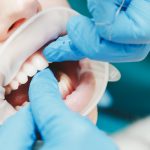Practitioner Spotlight: Dr. Michelle Jorgensen
Dr. Michelle Jorgensen is a certified Doctor of Dental Science (DDS) in American Fork, Utah. Dentistry is not only her profession, but her hobby and her passion. The challenge of helping someone get what they really want for their lifelong smile is what she lives for every day.
Why Choose a Holistic Dentist?

Modern medicine is becoming increasingly disconnected, separating body parts into different processes. Instead of a doctor who takes care of your overall health, specialists like an ENT or OBGYN are becoming more prominent. Traditional dentistry, unfortunately, has been following this trend. Somehow we’ve forgotten that it’s all part of one body system! This is the main difference between traditional and holistic dentistry; a holistic dentist will consider the relationship between your oral hygiene and your overall health. Western medicine and traditional dentistry generally focus on the immediate symptoms rather than addressing the root of the problem. For example, instead of simply filling a cavity a holistic dentist will analyze the causes and long-term solutions of the cavity. Why did you get that cavity? Is it due to an unbalanced diet? Are hormones affecting your teeth? Will the filling be a life-long solution and what adverse effects will it have on the body? Asking these questions will help prevent the never-ending loop of exams, crowns, fillings, surgeries, and root canals. When deciding on a dentist who will do more than just fix the surface issues, there are a few things to keep in mind. If their website has nothing more than information on pretty smiles and fillings, you may want to move on. When looking for a genuine holistic dentist, here are 10 important factors to consider:
10 Questions To Ask Your Holistic Dentist:

1. Do they use mercury?
Is the dental practice completely mercury free? This means the dentist does not place mercury-containing fillings or use this chemical in any procedures.
2. Do they have a mercury safety protocol?
If they do not administer mercury fillings, do they have a special protocol for removing them? To handle mercury safely, the office will have a mercury removal protocol which considers your personal safety.
3. What type of X-rays do they use?
Do they use radiation or digital X-rays? With the introduction of digital X-rays, the harmful radiation from outdated equipment is no longer acceptable. X-rays are essential in proper diagnosis, but make sure they only use digital equipment.
4. What is the dentist’s position on fluoride?
Fluoride incorporates into a tooth and makes it stronger. However, there are possible side effects that are too often ignored. For safe and effective use, fluoride should be used occasionally and never ingested.
5. Do they address nutrition?
Does your dentist address diet and nutrition in regards to your oral hygiene? Foods that are high in sugar or sodium are often a huge contributing factor to cavities and other dental problems. Make sure your dentist guides you through creating a diet that is healthy for your teeth, bones, and gums.
6. What is their opinion on root canals?
Do they take the proper precautions with root canals? Root canals are often a short-term solution that can save a tooth, but will have lasting negative effects on the rest of the mouth and body. Recent diagnostic technology has made the process much safer and effective, such as Conebeam CT scanners.
7. What is their position on bio-mimetic dentistry?
This is the process of mimicking nature when performing dental restoration. The closer to the original tooth or gum, the better the restoration.

8. Do they recommend holistic remedies?
Are they educated on alternative and holistic dental products? An experienced holistic dentist should have well-researched alternatives to the traditional dental products available to you.
9. How do they detect cavities?
What technology do they use to diagnose cavities? New technology is replacing the traditional exam, and specialized lasers are now available which can detect cavities with 90% accuracy. Ask if your dentist utilizes these lasers for dental exams.
10. Are they well-researched on tooth remineralization?

Teeth can absorb and lose minerals throughout your lifetime, so giving your teeth the proper minerals can help fight off cavities. Your dentist should be able to explain this process and give advice on how to utilize remineralization.
My Nova Healthcare provides coverage for both traditional and holistic methods, including holistic dentistry for Plan Members. My Nova Healthcare Company promotes natural approaches to wellness by promoting holistic dentistry and keeps member costs lower than other conventional insurance programs. Learn more about My Nova Healthcare and sign up for an account today!
